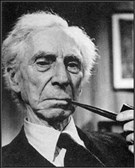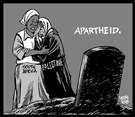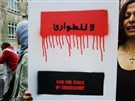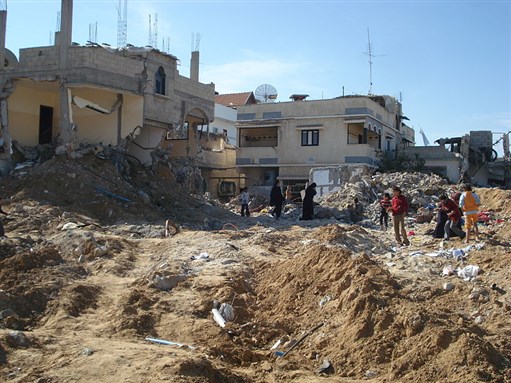[On 20 July 2015 Israel’s parliament adopted legislation pursuant to which individuals convicted of throwing stones at moving vehicles can be sentence for up to twenty years in prison. To be applied to Israel’s Palestinian citizens and the population of East Jerusalem, it imports military decrees that are already applied by Israel in the occupied territories against Palestinian residents but not Jewish settlers. Jadaliyya asked John Reynolds, lecturer in international law at the National University of Ireland, to explain the context and significance of this legislative initiative]
Jadaliyya (J): Please explain the recent changes in the Israeli penal code relating to the defined offense of throwing stones.
John Reynolds (JR): On 20 July, Israel’s parliament (Knesset) passed an amendment to the penal code to increase the maximum sentences for throwing stones or other objects at moving vehicles. It provides for several categories of offences that carry different prison terms. Where an intent to harm the occupants of a civilian vehicle is established, the stone thrower can be incarcerated for up to twenty years (whether or not such harm was actually inflicted). For the “lesser” offense of throwing stones where no harmful intent is proven, prison sentences of up to ten years will apply. Throwing stones at a police vehicle carries a sentence of five years.
Prior to this amendment, sentences for stone-throwing offenses under Israeli criminal law were limited to two years, with proof of malicious intent required for prosecution. This had led to irritation among Israeli lawmakers about obstacles to prosecutions of Palestinian stone throwers, and about the “lightness” of sentences. During 2014, the light rail serving Jewish settlements in East Jerusalem became a particular target of Palestinian frustration -- expressed through stone throwing -- at the suffocation of Palestinian life in the city, and the summertime destruction of the Gaza Strip. Prime Minister Benjamin Netanyahu promised “more aggressive legislation” against stone throwers, committee work began on a bill in late 2014 under the previous coalition government with Tzipi Livni as justice minister, and passed through a number of initial stages before the re-election of Netanyahu earlier this year in the slightly re-configured coalition. The bill was passed into law this week by a large parliamentary majority, including support from the main opposition party -- Livni’s Zionist Union.
For Palestinians, throwing stones at the agents and symbols of Israeli oppression is an often harmless, sometimes cathartic, always symbolic, small act of resistance. Edward W. Said is said to have described his own throwing of a stone at the Israel-Lebanon border fence in the wake of Israel’s withdrawal from southern Lebanon in 2000 as a “harmless act of joy”. For Livni’s successor as justice minister, Ayelet Shaked, however, “A stone thrower is a terrorist. ... Today, justice was done. For years, terrorists avoided punishment and responsibility. Tolerance towards terrorists ends today.” And lest we forget Israel’s ongoing civilizing mission, Knesset chairman and Zionist Union MK Hilik Bar said it was alright for Ahmad Tibi to criticize the Israeli military, but that he “must remember that it is only thanks to them that this debate can be held. Just as they protect me, they are protecting you, in this Middle Eastern Jungle.”
(J): These changes in the Israeli penal code appear to apply only to Israel and East Jerusalem rather than the entirety of the occupied Palestinian territories. Why is this significant?
(JR): The primary significance of this I suppose is to highlight the parallel legal systems that apply under Israeli jurisdiction, and the increasingly repressive nature of the law within its civil jurisdiction. Palestinians living under Israeli military jurisdiction in the West Bank have long been subject to these ten and twenty year sentences for throwing stones, under a range of military ordinances (for example, Military Order No. 1651 of 2009, which consolidated several earlier orders) that are applied through the occupation’s military court system. So the new legislative move appears to simply import the existing military law standards of the occupied territory back into the civil law system of the metropolitan state; a standard colonial technique. Foucault describes this as the “boomerang effect” of colonial practice on juridical and political structures in the metropole, where colonization involves not only the export of techniques and models to the colony, but their evolution and subsequent re-absorption back into the apparatuses, institutions, and instruments of power at home.
So these sentences that have now been incorporated into the penal code under Israeli civil jurisdiction had been previously normalized as part of the military law regime in the West Bank. This legal regime is made up of decrees written, interpreted and implemented by members of the occupying forces, and is central to the administration of the occupation. It operates to discipline and punish any dissent by the occupied population. In January of this year, for example, a fourteen-year-old Palestinian girl, Malak al-Khatib, was arrested on suspicion of throwing stones at an “apartheid road” reserved for Jewish settlers. Documentation published by Human Rights Watch indicates that during her arrest four soldiers beat her with a baton until she lost consciousness. Under interrogation, she signed a confession written in Hebrew, and was sentenced and imprisoned for stone throwing offenses following a plea-bargain agreement. This is par for the course in the Israeli military court system. The reproduction of such military decree-style sentences in East Jerusalem and Israel harks back to the period of military rule within Israel between 1948 and 1966, and holds a mirror up to the barrage of repressive and racist laws brought forward under the successive Netanyahu administrations since 2009.
(J): Are these changes in the penal code part of a broader pattern of such legislative initiatives directed at Palestinian citizens of Israel?
(JR): Yes, ultimately the legislative agenda of recent years is marked by a desire to asphyxiate political dissent and Palestinian cultural expression in Israel (and East Jerusalem) in a manner similar to the controls exercised over Palestinians in the rest of the West Bank and in the Gaza Strip. A raft of legislative initiatives have been introduced; when they are viewed together in panorama a stark pattern emerges of the concerted clamp-down on any divergence from dominant state narratives, be that in the realm of historical memory, social consciousness, economic activity or political agitation. The “Discriminatory Law Database” maintained by human rights organization Adalah now includes more than fifty pieces of legislation already enacted or in process, including laws that function to:
- prohibit the promotion of boycotts by citizens of Israel against Israeli institutions or Israeli settlement colonies in the Palestinian territories (the “Anti-Boycott Law”);
- deny funding to any organization that commemorates Israel’s “Indedendence Day” as a day of mourning (the “Nakba Law”);
- constitutionally determine the identity of Israel as the nation-state of the Jewish people - supplanting the ‘’Jewish and democratic” definition of the state and subordinating the democratic element - to the exclusion of Arab citizens (Basic Law: Israel as the Nation-State of the Jewish People);
- require citizens to declare a loyalty oath to Israel as a “Jewish, Zionist, and democratic state” (the “Loyalty Oath” Bill);
- revoke citizenship on the basis of a breach of trust or disloyalty to the state (Citizenship Law – Amendments).
And so on. This is all layered into the statutory system to reinforce the foundational legal architecture of the Israeli state’s settler colonial project, which is rooted in the expropriation doctrines, planning and land use policies, and eviction and “administrative” demolition practices that we have seen since 1948. Teju Cole captures this slow, cold violence of Israel’s law superbly in his searing “Bad Laws” essay in Vijay Prashad’s Letters to Palestine collection. The hot violence of Israel’s periodic wars on Gaza dominates our news feeds at sporadic intervals, but the ongoing accumulation of laws serves to entrench another particular form of control and suffocation in Israel and East Jerusalem.
(J): How have the intended victims of this new law responded?
(JR): There has been quite a vocal response from Palestinians, reflecting the symbolic significance of stone throwing, and the concrete impacts that prolonged sentences will have on Palestinian youth particularly. Gaza Youth Breaks Out, which produced the powerful Gaza Youth Manifesto in 2011, has pointed out that the terms of the amendment will operate to exclude settlers throwing stones at Palestinians homes and vehicles from punishment, while soldiers who fire live ammunition at children throwing stones remain unaccountable (earlier this month, seventeen-year-old Mohammad Kasba was killed by three bullets to the head and back by Colonel Yisrael Shomer on a street in Al-Ram, just outside Jerusalem. He is now the third in his family to have been shot dead by Israeli soldiers targeting kids throwing stones, after his ten-year-old and fifteen-year-old brothers before him).
Qadura Fares, head of the Palestinian Prisoners’ Club advocacy organization in the occupied territories, has said that “this law is hateful and contradicts the most basic rule that the punishment fit the offense.” In the Knesset, the Arab Palestinian members of the parliament made similar points about the oppressive character of the law and the disproportionate nature of the sentences. MK Jamal Zahalka asked: “Who will the judge send to prison? He who demolished the home, seized the land, killed the brother, or the boy who threw a stone? … The one who demolishes the home gets a medal, but the boy whose anger is justified gets punished. There is no justice in this law.”
![[The Israeli Knesset in session.]](https://kms.jadaliyya.com/Images/357x383xo/640px-PikiWiki_Israel_7260_Knesset-Room.jpg)

















